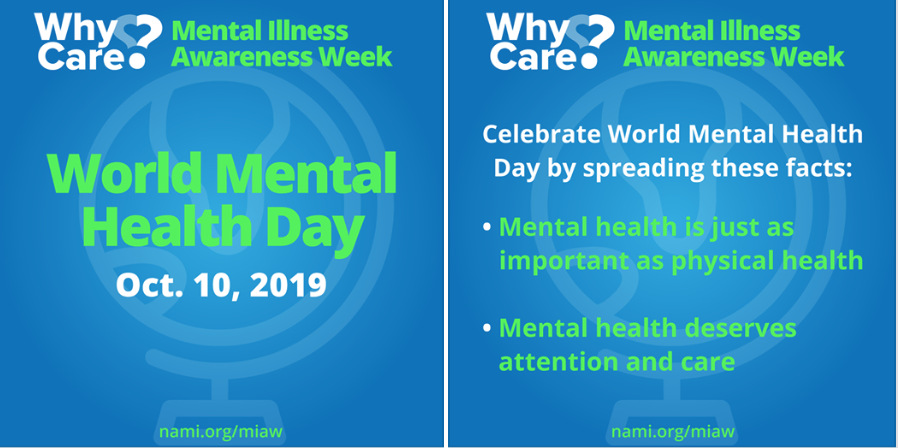Did you know on average, a person who suffers from a mental health related illness, waits at least a decade before seeking the necessary treatment, because of the stigma surrounding mental health? Why is it that individuals who are suffering from suicidal thoughts, are ashamed to come forward and seek help when they need it most? How many more lives must we lose to mental health related illnesses before we start viewing them for what they are? Illnesses. It is time to end the stigma surrounding mental health.
Everyone is encouraged to help spread awareness of the significance of suicide as a global public health problem; increase knowledge of what can be done to prevent suicide; reduce the stigma associated with suicide and mental health issues; and let people who are struggling know that they are not alone. Simply put, it is an opportunity to show you care. Whether it be initiating a conversation with someone you are worried about or sharing a message of hope with someone who is struggling.
If you or someone you know is in an emergency, call The National Suicide Prevention Lifeline at 800-273-TALK (8255) or call 911 immediately.
Mental Health affects 1 in 5
1 in 5 U.S. adults experience mental illness each year
1 in 25 U.S. adults experience serious mental illness each year
1 in 6 U.S. youth aged 6-17 experience a mental health disorder each year
Suicide is the 2nd leading cause of death among people aged 10-34
Are you tired of feeling tired all the time? Do you have problems sleeping? Do you binge eat or have a loss of appetite? Have you noticed that you haven’t felt yourself for some time now? Do you have headaches, body aches, congestion or a cough? Do you lose your temper or get into arguments with family or friends for no apparent reason?
If you’ve answered yes to any of the above, my guess is you have probably gone online and searched remedies for your symptoms. I’m sure your friends and family have given you lots of advice from home remedies to the newest fads to help you with your symptoms. Yet nothing has helped! The reason you’re not getting better is that you are treating the symptoms instead of the cause. This is very typical in modern medicine. Short lived symptoms can be a result of situational events and circumstances. However, if you have been suffering with your symptoms for over a year or more, please seek help.
Recognizing early symptoms of mental illness is critical. Early identification and treatment can make a big difference for successful management of a condition. For example, major depression is a mood disorder that is more serious than “feeling blue” or temporary sadness. Be alert to any combination of the following symptoms:
- Depressed mood (sadness)
- Poor concentration
- Insomnia
- Fatigue
- Disturbance of appetite
- Feelings of guilt
- Thoughts of suicide
Do you feel like life is not worth living?
You are not alone. Many people go through this. It is okay to talk about suicide. It is important to know, you can get better. There are people who can and want to help you. Talk to a trusted family member, friend, or co-worker; or a professional, such as a doctor, mental health counselor, or social worker about how you are feeling.
If you feel you are in immediate danger of harming yourself, call Suicide Prevention Lifeline: 1-800-273-8255 or 911 immediately.
Do you know someone who may be considering suicide?
Every 40 seconds, someone dies by suicide. For people with severe depression, it is not uncommon to think about suicide. What you should know if you are worried about someone:
- Suicides are preventable.
- It is okay to talk about suicide.
- Asking about suicide does not provoke the act of suicide, it often reduces anxiety and helps people feel understood.
Let them know that you are there to listen. Encourage the person to seek help from a professional. Help them find a professional to see, and offer to accompany them to an appointment. If you think the person is in immediate danger, do not leave him or her alone. Seek help from an emergency service, a crisis line, or a health-care professional. Stay in touch to check how the person is doing.
Suicide Prevention Lifeline: 1-800-273-8255
Treating the cause – We can help
At Dr. Diane Brain Health, we have an integrative team of brain health experts including traditional medical doctors, such as primary care, psychiatry, endocrinology, neurology, psychology, social work, physical therapy along with complementary and alternative therapy such as nutritional education, chiropractic, acupuncture, reiki and massage.
Using Dr. Diane’s 5-Prong approach we aim at treating clients/patients as a “whole”. Each person is seen from the five distinct views that make up our approach: physical, psychological, emotional, spiritual and energy because these areas intertwine and each needs to be addressed. From this approach your current symptoms are assessed and evaluated. From there, specific causes are addressed and a customized treatment program is developed specifically for both your current symptoms AND the causes of your symptoms.
To schedule a consultation, call (978) 352-6530 or toll free at (888) 760-8730.
There is help. There is hope.
There is a Way!®



